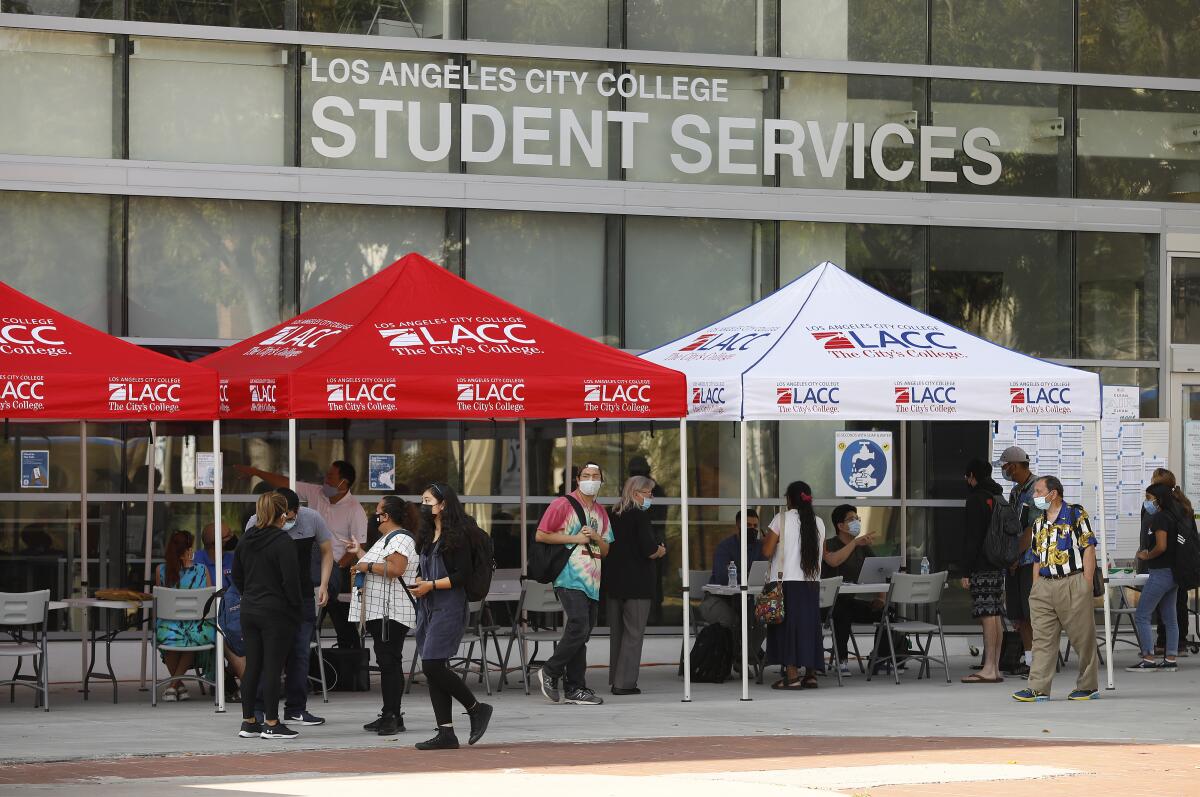California community college financial aid scam triggers federal warning to other campuses

- Share via
U.S. education officials issued a warning Thursday to thousands of colleges and universities across the nation to be on alert for fraud after California authorities uncovered a massive scam attempt involving 65,000 federal financial aid applications filed by fake community college students.
The Times reported this week that the California Student Aid Commission found 105 of 116 colleges in the California Community Colleges system had been targeted by questionable financial aid applications — including Cerritos, Pasadena, Chaffey and eight of the nine campuses in the Los Angeles Community College District.
The surge of applications began in May through mid-August and bore similar characteristics: first-time applicants to community college who were older than 30, earned less than $40,000 annually and were seeking a two-year degree rather than a vocational certificate.
Student aid officials and colleges found similar red flags in applications for enrollment and financial aid, including the same phone number or address for multiple students. The state community college system implemented a new bot detection software program in July and stricter security measures beginning this month. Colleges are now required to report monthly the number of incidents of suspected and confirmed registration fraud, the confirmed number of incidents of financial aid fraud and the incidents’ dollar value.
The colleges are investigating how many students are actually fake bot accounts and whether they inadvertently disbursed any financial aid to fictitious students. The U.S. Department of Education Office of Inspector General also is investigating.
Colleges that disburse federal financial aid to ineligible applicants must return the funds to the U.S. Department of Education.
California officials and community college staff have uncovered what is believed to be one of the state’s largest college financial aid scam attempts.
Federal education officials said Thursday they wanted to sound a national alert about the suspected fraud and remind colleges how to prevent it.
“Federal Student Aid is working with law enforcement partners and postsecondary institutions to stop the suspected financial aid fraud,” Richard Cordray, Federal Student Aid chief operating officer, said in a statement.
“While the investigation is ongoing, our work includes determining what, if any, federal taxpayer dollars were disbursed and recovering those funds,” he said. “We notified financial aid administrators at thousands of institutions across the country and recommended actions they can take to prevent fraud, as well as protect individuals. We also will take the necessary steps to prevent this type of suspected fraud in the future.”
In July, Federal Student Aid officials announced they would waive most verification requirements for financial aid applications for the 2021-22 academic year “in order to provide relief to students and colleges facing challenges resulting from the COVID-19 emergency.”
Officials waived requirements to prove income, for instance, which have been criticized as a cumbersome process that disproportionately burdens low-income families and may have contributed to a 9.5% decrease in enrollment at community colleges in spring 2021 from the previous year.
Waiving such financial verification requirements could help about 200,000 more students of color and those from low-income backgrounds enroll in college, officials said at the time.
Several California community colleges have reported an onslaught of enrollment attempts by bots in what may be a scam to gain financial aid or an effort to probe the system’s online vulnerabilities, California Community Colleges Chancellor Eloy Ortiz Oakley said.
Authorities are continuing to require verification of identity, high school completion and educational purpose — but suspended in-person submission and notary requirements, among other flexibilities, because of the pandemic.
“This has been an exceptionally tough year,” Cordray said in a July statement announcing the more flexible financial aid application process. “We need to ensure students have the most straightforward path to acquiring the financial aid they need to enroll in college and continue their path to a degree. Targeting verification to focus on identity theft and fraud this aid cycle, ensures we address immediate student needs, continue to protect the integrity of the Federal Pell Grant Program, and reduce barriers to access for underserved students.”
On Thursday, student aid officials posted a reminder that colleges are still legally required to verify a student’s identity and “maintain and should exercise the discretion to select students for other types of verification.”
“Be on the lookout for unusual FAFSA [Free Application for Federal Student Aid] and/or enrollment patterns that may indicate fraud,” the notice said.
Suspected fraud should be immediately reported to the Office of Inspector General hotline at 1-800-MIS-USED (1-800-647-8733).
More to Read
Sign up for Essential California
The most important California stories and recommendations in your inbox every morning.
You may occasionally receive promotional content from the Los Angeles Times.













